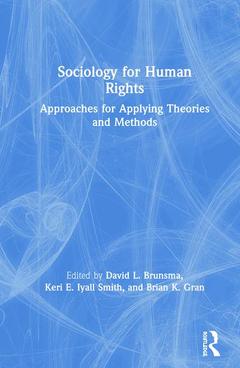Sociology for Human Rights Approaches for Applying Theories and Methods
Coordonnateurs : Brunsma David, Iyall Smith Keri, Gran Brian

As sociologists deepen their examinations of human rights in their teaching, research, and thinking, it is essential that such work is conducted in a manner that is both mindful and critical of the knowledge we are building upon in sociology and human rights. As the authors of this volume reveal, creating sociological knowledge that examines human rights for the expansion of human rights is something that sociologists are well equipped to undertake, whether through the use of mathematics, comparative-historical analysis, the study of emotions, conversations, or social psychology. In these chapters you will find the roots of the study of human rights deep within sociological research and thinking as well as emerging techniques that will push the discipline as it seeks to expand understanding of human rights together with so many other aspects of the social condition.
1. Introduction: Creating Knowledge About Human Rights Sociologically 2. Methodology 3. Mathematical Sociology 4. Ethnomethodology and Conversation Analysis 5. Comparative and Historical Sociology 6. Political Economy of the World-System 7. Social Psychology 8. Sociological Practice and Public Sociology 9. Teaching and Learning 10. History of Sociology 11. Theory 12. Emotions 13. Marxist Sociology Discussion Questions; List of Acronyms; Bibliography; About the Contributors
David L. Brunsma is Professor of Sociology at Virginia Tech in Blacksburg, Virginia, USA. His areas of research include sociologies of human rights and human rights sociologies; racial identity and racism; cognitive sociology and epistemologies; and multiraciality and whiteness. He is currently founding co-editor of the journal Sociology of Race and Ethnicity, a former co-editor of Societies Without Borders: Human Rights andthe Social Sciences, and section editor of the Race and Ethnicity section of SociologyCompass. He lives and loves with his family in Blacksburg, Virginia.
Keri E. Iyall Smith’sresearch explores the intersections between human rights, the state, and indigenous peoples. She is author of The State and Indigenous Movements (2006), editor of Sociology of Globalization (2012), and co-editor of several books, including Public SociologiesReader (with Judith R. Blau, 2006) and Human Rights Of, By, and For the People (with Judith R. Blau and Louis E. Esparza, 2017). She is Associate Professor of Sociology at Suffolk University in Boston, Massachusetts, USA, where she teaches courses on globalization, sociological theory, indigenous peoples, and introductory sociology. She is a former vice president of Sociologists without Borders.
Brian K. Gran is a sociologist and lawyer whose research, teaching, and service revolve around law, human rights, and social policy. Gran has recently enjoyed invitations to give lectures to Seoul National University, Sungkyunkwan University, COST Action IS1409, and the UN Committee on Economic, Social and Cultural Rights. He edits Societies Without Borders: Human Rights and the Social Sciences and has been invited to serve on the inaugural advisory board of the Sociology Action Network. He was a British Academy Visiting Fellow and a Fulbright Scholar to Iceland. Gran is one of fourteen members of the US Na
Date de parution : 08-2019
15.2x22.9 cm
Date de parution : 08-2019
15.2x22.9 cm
Thème de Sociology for Human Rights :
Mots-clés :
East Turkistan Islamic Movement; Marxism; post-World War II International System; Social Justice; Improve Life Situations; Social-Justice Teaching; Nelson Mandela; Social Ecology; Van Kleeck; Social Policy; Salwa Judum; Public Sociology; Human Suffering; World-System; Emotional Debilitation; Political Economy; Public Engagements; Comparative-Historical Analysis; Contemporary Societies; Ethnomethodology; Human Rights; Social Groups; Global Women’s Human Rights; Social Psychology; Vice Versa; Study of Emotions; Clinical Sociology; Mathematical Sociology; Social Ecological Theory; National Action Plans; cognitive sociology; Practical Sociological Reasoning; Pair Part; Women’s Human Rights Movement; Emotional Culture; Emotion Norms; MCA; Dominant Subordinate Relationships
